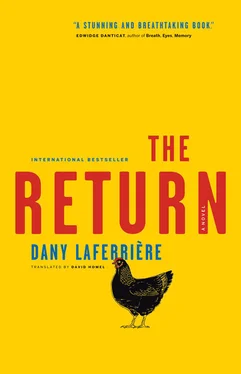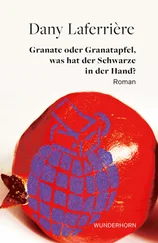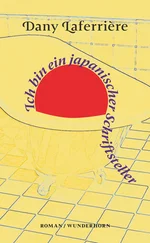I escape into my thoughts
before sleep catches up to me.
The surrender is so sweet.
To fall asleep in one city
and wake up in another.
The train pulls into the next station. The girl beside me who was reading a Tanizaki novel gets off. A young man waits for her with a bouquet of mimosas and furtive kisses. The platform empties. The couple is still fused, mouth to mouth now. The train pulls away. The girl forgot her book on the seat. She’s already elsewhere. The book, like the train, served only to carry her to him.
I think back to my first suitcase forgotten in one of the city’s narrow dusty rooms. Luckily I was able to hold onto the only things worth saving. A letter from my mother in which she explains, sparing no detail, how to live in a country she’s never visited, and that dog-eared copy of Notebook of a Return to the Native Land by the Martinican poet Aimé Césaire. I still have both those things.
That phone call in the middle of the night. Are you Windsor Laferrière? Yes. This is the Brooklyn Hospital. . Windsor Laferrière has died. We have the same name.
They found my phone number in his pocket. The nurse who looked after him is on the line. In a soft, even voice she tells me he would come and see her when he wasn’t feeling well. Sometimes his attacks were serious. No one else but me could get close to him at those times. A very sweet man despite the anger that was so strong inside him. Your father died smiling, that’s all I can say. Lying on my back, I stare at the ceiling for a long while.
I get off in Toronto. A quick stop to see an old painter friend. We go for a drink in a bar near the gallery where he has a show. Since we’re the same age the same things happened to us about the same time. His father died at the beginning of the year; he’d had to flee the country during the same period mine did. We’re a generation of sons without fathers who were raised by women whose voices became even shriller when circumstances got too much for them. We end up drinking rum in his dark little studio. At dawn, he goes with me to the station.
I always travel with Césaire’s collection of poems. I found it dull the first time I read it, nearly forty years ago. A friend had lent it to me. Today it seems strange that I could have read it at age fifteen. I didn’t understand the devotion the book created among young people from the Antilles. I could tell it was the work of an intelligent man filled with terrible anger. I could feel his clenched jaw and imagine his eyes veiled in tears. I saw all those things, but not the poetry. The text seemed too prosaic. Too bare. Now, on this night, as I finally travel toward my father, suddenly I can feel Césaire’s shadow behind his words. I can see how he went beyond his anger to discover new territories in his adventure with language. Césaire’s striking images dance before my eyes. That all-powerful rage arises more from a desire to live in dignity than a will to denounce colonialism. The poet helps me draw the line between the pain that tears me apart and my father’s subtle smile.
There is a photo of Césaire
sitting on a bench.
The sea behind him.
In a flowing khaki jacket
that makes him look like a frail bird.
His faded smile
and his wide eyes so gentle
do not reveal the rage
that changes him, before our eyes,
into a charred tree trunk.
Umbrellas of every color. The air is so warm in New York after the freezing weather in Montreal. My uncles are happy for the warmth, though a bit surprised. It’s almost like summer. Manhattan in the tropics. My Uncle Zachée maintains that nature is giving a gift to my father who hated the cold and compared it to the njustice of men. The rain arrived too late in his case.
A crowd in this big Manhattan church
for a man who lived alone
the last years of his life.
He was not forgotten.
Since he didn’t want to see anyone,
people patiently awaited his death
to pay him tribute.
Now that he cannot flee
they burden him with compliments.
The sedentary like to see
the nomad made immobile.
Enclosed in a long box
he must think is a pirogue
that will let him skim across
the Guinaudée of his boyhood.
For many of these old Haitian taxi drivers, accompanied by their wives, most of them nurses’ aids at the Brooklyn Hospital Center, he remained the young man who stood up to the power and abuse of the President-for-Life. The glory of their youth.
It is the first time
I’m seeing him from so close.
I just have to reach out
my hand to touch him.
But I don’t
to respect the distance
he wanted to maintain between us
during his life.
I remember that passage in the Notebook where Césaire demands the body of Toussaint Louverture, arrested by Napoleon, killed by the cold during the winter of 1803 in Fort de Joux, France. His lips trembling with contained rage the poet comes to demand, 150 years later, the frozen body of the hero of the slave revolt: “What is mine a lone man imprisoned in whiteness.”
A woman in a long white astrakhan coat
stands discreetly by the last column.
A ghost of a smile.
The smile of someone who knows
death can never erase
the memory of a certain summer afternoon
in an overheated room in Brooklyn.
Until the end,
even dirty,
even crazy,
my father remained
the dandy he’d always been.
Charm can’t be explained.
I wonder who they’re celebrating
when the one they’re talking about
can’t hear a word.
One of his old buddies is telling a story
that seems to amuse everyone.
I hear their laughter from a distance.
My father, very close by, in his casket.
I keep watch from the corner of one eye.
A star too blinding
to look at straight on.
That’s what a dead father is.
One thing’s for sure: my father won’t have died until that woman hears the news. And right now she is sitting on her gallery in Port-au-Prince thinking, as usual, about him. Which is what she has been doing every day since he left. Does she know the wind has blown so hard these last days that it has carried off the tree of which I am but a branch?
Outside it’s a real tropical storm.
Broken tree branches.
Taxis drift, as if drunk,
down Fifth Avenue.
The hearse, unshakable, glides across the water.
It’s like being in Baradères, my father’s native village
and the Venice of Haiti, or so they say.
A Little Room in Brooklyn
My father lived in a little room that was practically empty. My uncles took me there after the burial in the rain at the Green-Wood Cemetery. Toward the end he had rid himself of everything. All his life he was a solitary man though his political activities put him into contact with other people. Every day for twenty years, summer and winter, he walked from Brooklyn to Manhattan. His life could be summed up in that constant movement. His only possession was the suitcase he had entrusted to the Chase Manhattan Bank.
My father spent
more than half
his life
far from his land
from his language
and his wife.
Several years ago I knocked on his door. He didn’t answer. I knew he was inside the room. I could hear him breathing noisily behind the door. Since I had come all the way from Montreal, I insisted. I can still hear him yelling that he’d never had a child, or a wife or a country. I had gotten there too late. The pain of living far from his family had become so intolerable he had to erase the past from his memory.
Читать дальше












